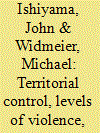| Srl | Item |
| 1 |
ID:
141824


|
|
|
|
|
| Summary/Abstract |
As new academic journals have emerged in political science and existing journals experience increasing submission rates, editors are concerned that scholars experience “reviewer fatigue.” Editors often assume that an overload of requests to review makes scholars less willing to perform the anonymous yet time-consuming tasks associated with reviewing manuscripts. To date, there has not been a systematic investigation of the reasons why scholars decline to review. We empirically investigated the rate at which scholars accept or decline to review, as well as the reasons they gave for declining. We found that reviewer fatigue is only one of several reasons why scholars decline to review. The evidence suggests that scholars are willing to review but that they also lead busy professional and personal lives.
|
|
|
|
|
|
|
|
|
|
|
|
|
|
|
|
| 2 |
ID:
126022


|
|
|
|
|
| Publication |
2013.
|
| Summary/Abstract |
This paper explores debates about electoral patterns in post-civil war societies. In particular, we examine whether the ability of rebels to capture and control territory and the level of violence at the local level explains the electoral performance of former rebel political parties, focusing on the Islamic Renaissance Party of Tajikstan (IRPT) and the Communist Party of Nepal (Maoist) (CPN (M)). Using data from the 2000 legislative election in Tajikistan and the 2008 Nepalese Constituent Assembly election, this paper finds that rebel control over districts did explain rebel party's electoral performance in Nepal. However, rebel control of districts in Tajikistan during the civil war did not predict the electoral performance in the first post-conflict election in that country. This is largely due to the disconnect between the IRPT and the constituencies that had supported it during the civil war, and because the level of control that the party exerted was far less than that of the CPN (M).
|
|
|
|
|
|
|
|
|
|
|
|
|
|
|
|
| 3 |
ID:
193101


|
|
|
|
|
| Summary/Abstract |
Terrorist organizations do not solely rely on violence, but also utilize a range of nonviolent activities from political engagement to social services provision. We argue that terrorist organizations that use a combination of violent and nonviolent strategies are more effective in achieving two important organizational goals than those that rely solely on violent strategies. Using the Reputation of Terror Groups Dataset (2016), we demonstrate that organizations that deploy a mix of violent and nonviolent strategies are better able to attract new recruits and carry out more lethal attacks than those that rely exclusively on violence.
|
|
|
|
|
|
|
|
|
|
|
|
|
|
|
|